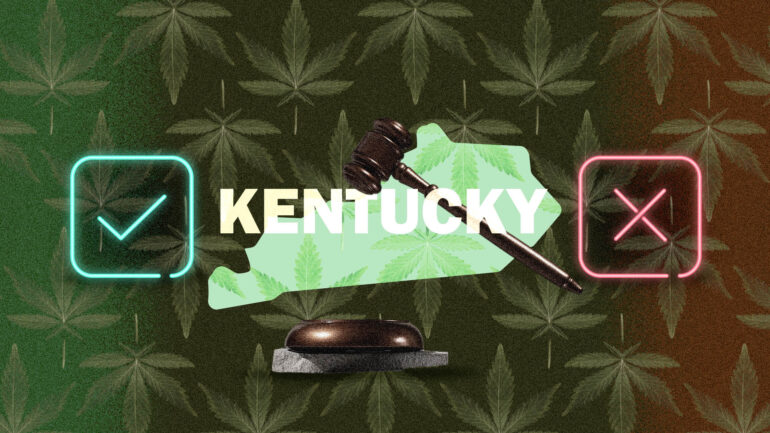Key Takeaways
- Recreational weed use and possession is illegal in Kentucky, with a fine of up to $250 and the possibility of up to 45 days in jail.
- Medical marijuana will be legal in Kentucky from January 1st, 2025.
- In Jefferson County, low-level (less than an ounce) cannabis possession is no longer being prosecuted, unless the person is under 21 or there is another, more serious offense too.
Weed is not legal for recreational use in Kentucky, but medical cannabis is legal from the start of 2025.
Additionally, the state does have a hemp law, which permits products like delta-8 THC in the state, provided they meet certain requirements.
There are still issues with the state’s medical marijuana law, but the progress on that front will hopefully lead to change for recreational use too.
Here’s what you need to know about Kentucky weed laws as they stand today and what will change in 2025.
Is Cannabis Legal in Kentucky?
Weed is not legal in Kentucky for recreational use, but has been legalized for medical use. Possession is punished with a $250 fine and possible jail time. However, hemp products such as delta-8 are legal.
Recreational Cannabis Laws
Kentucky bans recreational weed use in line with federal law.
This means you can’t possess marijuana for personal use, and even paraphernalia like bongs and pipes are banned under state law.
There are a couple of areas within the state that have decriminalized weed, but overall at the state level, it remains a controlled substance.
Penalties for Possession
The penalties for weed possession in Kentucky aren’t so severe compared to other states, but it is still possible to get jail time for simple possession and any amounts above 8 ounces are treated as possession with the intent to sell.
- If you’re caught with less than 8 ounces of marijuana, you can receive 45 days in jail and a fine of up to $250.
- If you have more than 8 ounces, but less than 5 pounds, you’ll get 1 to 5 years in prison and a fine of up to $10,000. For a subsequent offense, the jail time increases to 5 to 10 years.
- If you have 5 pounds or more, you’ll get 5 to 10 years in jail in the first instance and 10 to 20 if it’s a second or subsequent time. There’s a fine of up to $10,000 in both cases.
Medical Marijuana Laws
Medical marijuana is legal in Kentucky from January 1st, 2025.
Governor Andy Beshear signed SB 47 into law in March 2023, which enables qualifying patients to use cannabis for their medical condition.
As in most states, there is a specific list of qualifying conditions, and the state imposes a possession limit corresponding to a 30-day supply. Although your doctor is allowed to prescribe larger amounts than this if it is deemed necessary, the recommendation is that a 30-day supply is 112 grams (just under 4 ounces) of raw plant material. However, it is not permitted to smoke medical cannabis in the state.
The legislature also passed HB 829 in 2024, which brought forward the date for licensed cultivators to start operating, but also added restrictions. In particular, it prevents people with a felony drug conviction or a violent felony conviction from participating in the program, and it makes it possible for localities to “opt out” of having cannabis businesses after the date businesses are licensed and begin operations.
How to Get a Medical Marijuana Card in Kentucky?
The Kentucky Office of Medical Cannabis lays out the requirements for getting a medical marijuana card in the state.
From November 1st, 2024, it’s possible to get a certification from a medical professional (with whom you have a bona fide patient-practitioner relationship) and have it remain valid long enough to make your application on January 1st, 2025 when the registration period begins.
However, the certification is only valid for 60 days, so ensure that you can complete the application within this time frame.
You must have one of the qualifying conditions to be certified for medical cannabis in the state. These are:
- Any type or form of cancer;
- Chronic or severe pain;
- Epilepsy or other intractable seizure disorder;
- Multiple sclerosis, muscle spasms, or spasticity;
- Chronic nausea or cyclical vomiting syndrome; or
- Post-traumatic stress disorder.
You can then apply for your Kentucky medical marijuana card using this certification and your personal information for a $25 annual fee.
Can You Consume in Public in Kentucky?
Unless you’re a medical cannabis patient, you cannot consume cannabis in public in Kentucky, and medical patients cannot consume cannabis by smoking under any circumstances.
SB 47 details (page 10/section 5(1)(e) and (g)) that you can’t possess or use medical cannabis on federal government property, in a correctional facility or on school grounds.
However, aside from the restriction on smoking, it appears that you can use medical marijuana in locations other than these.
Can You Drive Under the Influence of Marijuana?
Driving under the influence of marijuana is illegal in Kentucky (page 1, section (1)(c) and (d)), as it is in every other state. It used to be that having any detectable amount of THC in your blood was grounds for a conviction, but now it is exempted (page 4, section (12)(a)).
The state also has an implied consent law, so you’re already considered to have given your consent to blood, breath and urine tests by driving on the roads in the state. If you refuse, your license will be revoked.
For the DUI itself, the punishments are:
- For a first offense, you’ll be fined between $200 and $500, or you’ll be put in county jail for between 48 hours and 30 days, or both. You can potentially replace either or both of these with 2 to 30 days in a community labor program.
- For a second offense (within 10 years), the minimum fine increases to $350, with the same $500 maximum, and the jail time increases to between 7 days and 6 months. In this case, you may also be sentenced to community labor for between 10 days and 6 months.
- For a third offense (within 10 years), the fine increases to between $500 and $1,000, and you’ll be imprisoned for between 30 days and a year. You may also be sentenced to between 30 days and a year of community labor.
- For a fourth or subsequent offense (within 10 years), you’ll be imprisoned for between 1 and 5 years and receive a fine of between $1,000 and $10,000.
Is Delta-8 THC Legal in Kentucky?
Delta-8 THC is legal in Kentucky, despite some confusion from April 2021 to February 2022.
As in most states, Kentucky aligned its hemp laws with the federal Farm Bill through HB 197. The legislation defines hemp (page 1, line 15) in line with the Farm Bill, so essentially as any Cannabis sativa L. plant and all its cannabinoids, provided the delta-9 THC level is lower than 0.3% by dry weight. This, by definition, includes delta-8 THC.
However, the Kentucky Department of Agriculture published a letter in April 2021 that claimed that “delta-8 is a Schedule I controlled substance under federal law and Kentucky law,” basically purely looking at the state’s controlled substances list.
However, this is wrong because, as the attorney for the Kentucky Hemp Association pointed out in his letter, there is an exemption for “hemp” (as defined legally) in both the federal and state-level controlled substances acts.
So since delta-8 is “hemp” provided it was extracted from a hemp plant, it is exempted from the definition. The Boone Circuit Court judge assigned the case agreed with the Hemp Association, and delta-8 remains legal in Kentucky.
Is Weed Decriminalized in Kentucky?
Weed is not decriminalized in Kentucky as a whole state. However, there is decriminalization at the local level in some cases.
In Jefferson County, the Attorney’s Office stopped prosecuting people for marijuana possession in 2019.
This de facto decriminalization comes with caveats, in particular, that the person has to be over 21, it has to be the only or at least the most serious offense they were stopped for, and it has to be for less than an ounce of marijuana. It also decided to stop prosecuting for possession of paraphernalia when it is clearly for use with marijuana.
On an even more local level, Louisville has officially made punishment for “small amounts” (here less than a half-ounce) of marijuana the lowest law enforcement priority. Combined with the fact that the Attorney won’t prosecute in the county, this makes it very unlikely you’d be punished for a small amount of weed.
Officers who do punish someone for weed won’t get in trouble, and weed still isn’t technically “decriminalized” in Louisville (because the crime still exists), but the overall impact is equivalent to decriminalization.
Is Growing Weed Legal in Kentucky?
Growing weed is not legal in Kentucky. The way it’s treated by the law depends on the number of plants you were growing, with five plants or more being considered as grown to sell or transfer.
- If you have fewer than five plants, it’s a class A misdemeanor in the first instance. This carries a maximum sentence of a year in prison and a fine of up to $500. However, subsequent offenses are class D felonies, which carry 1 to 5 years in prison and fines from $1,000 to $10,000.
- If you have more than five plants, it’s a class D felony in the first case. This has the same 1 to 5-year prison sentence and $1,000 to $10,000 in fines. For subsequent offenses, it’s a class C felony, and the jail time increases to 5 to 10 years, with the same fine.
When Will Weed Be Legal in Kentucky? The Future Outlook
After the win for the state on medical marijuana, the next goal for advocates and pro-cannabis lawmakers in the state is full recreational weed legalization in Kentucky. However, this may still take some time before it’s achieved.
There were three attempts to legalize cannabis for recreational use in 2024, HB 72, HB 160, and the aptly-numbered HB 420.
HB 72 tried to do this without introducing commercial sales, instead relying on home cultivation. HB 160 would have put it on the ballot for voters to make the choice. And HB 420 would have established commercial legalization.
Every single one of these bills went to the “Committee on Committees” and never came out.
This tells us a couple of things. Firstly, there is definitely an appetite among some state lawmakers to legalize cannabis and bring an end to the failed “war on drugs,” at least as it relates to cannabis. Secondly, efforts are stalled early on in the legislative process, particularly with Republican control of the House.
It’s likely that such efforts will continue for the coming years, but if the experience getting a medical marijuana law passed is anything to go on, it will likely take a few years before anything comes to fruition.
Conclusion
Kentucky weed laws went from being some of the worst in the country to merely mid-level after the legalization of medical marijuana.
The medical program may have some limitations, but it is a drastic improvement for a state where intoxicating hemp products were the only legal option for some time. Recreational legalization is likely still some years off, but the tide is turning in the state, albeit slowly.

